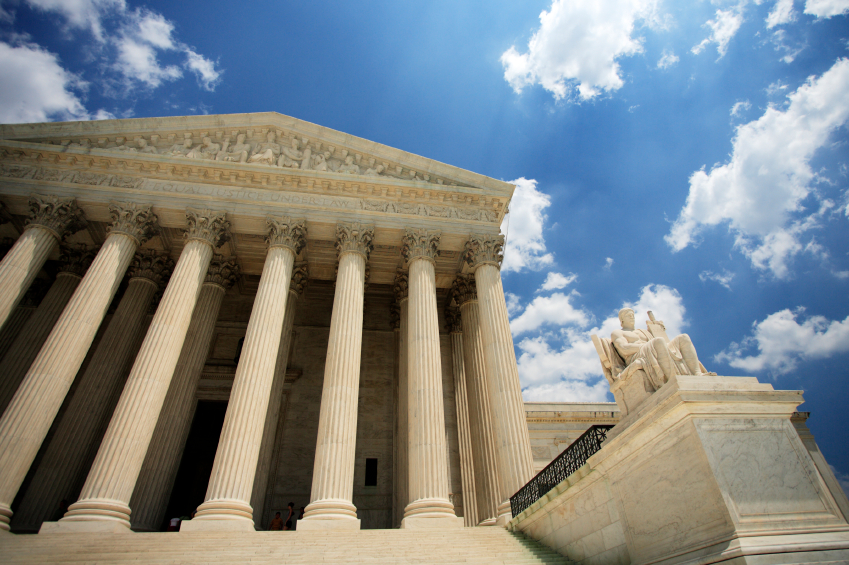SLS Con Law Faculty Discuss Justice Kennedy’s Legacy and Retirement
U.S. Supreme Court Justice Anthony M. Kennedy announced today that he will retire at the end of July—handing President Trump an opportunity to reshape the Court for generations to come. Here, several Stanford Law School Constitutional Law scholars discuss Justice Kennedy’s legacy and the timing of his retirement.

“In Macbeth, after the Thane of Cawdor is executed, Malcolm tells the king that “Nothing in his life/Became him like the leaving it.” Until today, the centerpiece of Justice Kennedy’s legacy was probably his opinions for the Court in the gay rights trilogy of Romer v. Evans, United States v. Windsor, and Obergefell v. Hodges. But now, it may turn out that his leaving the Court and leaving a potential appointment to Donald Trump, a man with no real respect for the Constitution, will be his most important legacy because he has given Trump an opportunity to create a Court that will lurch the law to the right for a generation or more.” —Pamela S. Karlan is the Kenneth and Harle Montgomery Professor of Public Interest Law and co-director of the Stanford Supreme Court Litigation Clinic.
“Justice Kennedy’s emphasis on dignity was striking, from his less prominent discussions of the dignity of states under the 11th Amendment to the more well-known decisions like Lawrence v. Texas and Obergefell v. Hodges affirming the dignity entailed by individuals’ life choices. At the same time, Justice Kennedy moved the Court away from emphasizing strict scrutiny for fundamental rights and toward a standard that was somewhat similar to what Justice Stevens had advocated early in his tenure on the Supreme Court in Craig v. Boren, where he opined that “There is only one Equal Protection Clause. . . . It does not direct the courts to apply one standard of review in some cases and a different standard in other cases.” Likewise, Justice Kennedy, when newly recognizing constitutional rights, opted to employ a heightened rationality review rather than intermediate or strict scrutiny. Also echoing Stevens, who was similarly appointed by a Republican, Justice Kennedy became perceived as increasingly sympathetic to liberal causes over time as the Court itself moved further to the right. The appointment of a replacement by President Trump is, by contrast, likely to confirm a very conservative majority that will remain consistent over many of the most politicized issues that the Court considers, including immigration, the First Amendment, abortion, affirmative action, executive power, and other salient concerns of our time.” —Bernadette Meyler is the Carl and Sheila Spaeth Professor of Law.
“LGB rights will surely be at the center of Justice Kennedy’s legacy. He wrote every one of the four blockbuster cases protecting gay rights over the last 20 years–Romer protecting gay civil rights, Lawrence striking down sodomy laws, Windsor striking down the federal Defense of Marriage Act, and of course, Obergefell protecting marriage equality. His departure puts his legacy on these issues very much in question. And while he did side with the baker this Term in a First Amendment case involving the baker’s refusal to bake for a same-sex wedding, he wrote a very narrow opinion and included strong language supportive of laws protecting LGB people from discrimination in the commercial sphere. A court with an additional Trump nominee is likely to be more skeptical of protecting LGB equality and more open to broadly-conceived religious liberty claims. We do not have a clear sense of where Justice Kennedy would have been on the claims for transgender equality that will reach the Court before too long, but it seems unlikely that a new Trump nominee will be sympathetic to those claims.
Justice Kennedy voted with the conservative majority in all the controversial, 5-4 cases this term. And in past terms, he authored the Citizens United ruling on campaign finance, and joined the majority in such controversial rulings as Bush v. Gore and the Shelby County case knocking out a key part of the Voting Rights Act. On issues like these and many others, his replacement may not make a big difference. But just two years ago, Kennedy provided a swing vote to allow universities to pursue affirmative action through holistic admissions plans in Fisher II and, in Whole Women’s Health, for protecting a women’s right to terminate a pregnancy in the face of regulation that severely obstructed that right. The future of both affirmative action and abortion as a constitutional matter are now squarely in doubt. Fundamental change on major, politically salient Fourteenth Amendment issues, may well be in the offing.
One of the things I will be watching is whether, long term, the consolidation of a more stable conservative majority on the Supreme Court changes the valence of the politics of opposing judicial activism. Since the days of the Warren Court, the Republican Party has been much more galvanized than its Democratic counterpart on courts as a voting issue. That may change if the left is more consistently aggrieved with the Court.” —Jane Schacter is the William Nelson Cromwell Professor of Law.
